#and i mean both visually (i.e. a group of man sitting in rooms making the ''big'' decisions)
Explore tagged Tumblr posts
Text
so whooooooo's gonna write the big essay about how Oppenheimer and Barbie actually overlapped on some themes?? there's gotta be someone smarter and more eloquent than me ready to this cause I ain't not writer and I don't have a platform
#and i mean both visually (i.e. a group of man sitting in rooms making the ''big'' decisions)#and conceptually (human beings are complex and embracing that individually is how it will bring us closer to one another)#LIKE im connecting dots in my brain but I don't know if it's just me??? somebody help me#barbenheimer
2 notes
·
View notes
Text
Mike/Will Season 2, Episode 1: A Shot by Shot Analysis
Ok, here it is! The first installation of my shot-by-shot analysis series!
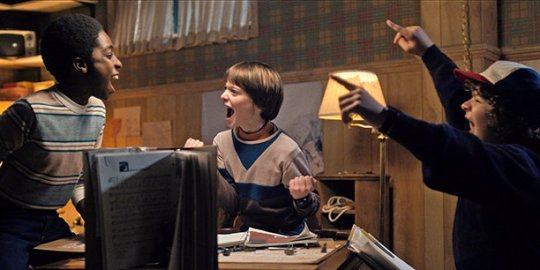
Some things to know before reading:
This series will go episode by episode and each post will discuss scenes that I think are relevant to understanding Mike and Will’s relationship. I’m publishing them as I write them, so I might miss things. If I do, I’ll be sure to include them later.
This analysis focuses on what I think the Duffers’ intentions are as far as this pairing and what the Mike/Will scenes in season two could indicate about season three. It’s not always going to reflect that Byeler is endgame, because as much as I love Byeler (and I really do), I just don’t think it’s going to be canon, at least not in the way that we hope. Don’t despair, though.
If you haven’t, read my Is Will Byers Gay? post first! It basically establishes my thoughts about Gay Will. Give it a reblog if you’re so inclined :) Note that I wrote it BEFORE I knew about the stranger things bible clipping which basically confirms it, which you can find here.
These are just my thoughts/opinions! Feel free to disagree, and please do! Just do so respectfully :) I wrote this because I love Stranger Things, something we ultimately all have in common. If you have negative/nasty opinions about this analysis or are offended by the suggestion that Will Byers is gay, I ask politely that you keep them to yourself.
I couldn’t find gifs for everything I wanted :/ if someone knows a better way to do this, I’d appreciate the help!
Anyway, thanks so much for reading! I hope you enjoy! (Also: I’m tagging @packupyourthingses @leondrmccoys @we-dance-like-marionettes who (I think?) asked to be tagged, and @thebandersnatchoftheshire who expressed an interest in the post a while back.)
EPISODE 1: MAD MAX
Let’s start off with some general observations.
In the first season, Will is missing, leaving his three best friends and Eleven to recover him. In the second season, Will is back, Eleven is gone, and Max has joined the party. Obviously, each of these changes makes a significant contribution to existing group dynamics. Mike, for example, changes significantly in the wake of Eleven’s departure, while Lucas and Dustin are overjoyed at Max’s arrival.
In season 1, storylines are segmented by age group. i.e., the kids, teenagers, and adults all embark on separate adventures that ultimately converge. As we would expect of a second installation, narratives in season two reflect character and story arcs established earlier. As a result, the groups are not so neatly divided. Ergo, Steve hangs with Dustin/Lucas/Max, Mike/Will end up with Joyce/Hopper, etc.
Crucially, the core group of boys is divided into pairs. Mike and Will spend most of the season together, as do Dustin and Lucas. The use of these pairs, which are established almost immediately, is an unmistakeable narrative device all throughout the season.
1. Arcade


The arcade scene is the first in the season of all the boys together. They spend the first half of it together playing video games, arguing with Keith, etc, and the second half divided into pairs. This begins when Will is transplanted suddenly into the upside down and steps outside the arcade.
Lucas and Dustin, at that point, are preoccupied with divining MadMax’s true identity. Because of this, it’s Mike who comes out to check on Will, and likely the one who noticed he was missing in the first place. This is the first clue as to the extent of the closeness between the two. It’s deliberate: as we see here, and throughout the season, Will/Mike and Dustin/Lucas are partitioned, and their individual friendships are developed.
In the scene, Mike comes outside and finds Will. He then makes sure he’s okay, puts his arm around him, and guides him inside. This gesture, to me, reads as pretty innocuous physical affection (of course, you’re welcome to disagree). It was, however, a conscious stylistic choice, made by the duffers with the intention of communicating a number of things. In this scene, we begin to learn firstly that Mike and Will are close, and secondly, that Mike is protective of Will, concerned for his wellbeing, and (probably) an important source of emotional support. The arm gesture underscores Mike’s key character traits: his protectiveness, his characteristic warmth and compassion for others, and his ability to take charge when the situation calls for it and help those in need.
Here’s why that matters: Mike’s behavior in this particular scene is especially interesting in the context of his recent character development. Eleven’s disappearance has clearly affected him profoundly, and in the first three episodes of the season, we learn just how much. Earlier in episode one we see him stealing from Nancy, and in a later scene with his parents, we learn that he’s acted out in a number of ways over the past year, all indicating that Mike’s moral compass, distinct and venerable in season 1, has weakened somewhat. Same goes for his trademark positivity and determination. This season he’s sullen, irritable, apathetic, and in [my paraphrasing of] Finn Wolfhard’s own words, “not as much of a leader.”
And yet, Mike manages to be there for Will in that moment, to take note of his presence (or lack thereof), to guide him, to help heal him. It would appear that, in Mike’s moody “post-eleven period”, it is in his relationship with Will that he has remained his best self.
The question is, WHY? In the first episode of Beyond Stranger Things, Finn Wolfhard remarks (and the Duffers agree) that in Eleven’s absence, Mike needs “someone to impress” and therefore “tries to impress Will”. I also agree with this interpretation. Romance aside, Mike and El’s relationship is (among other things) characterized by a deep mutual admiration. Will, who’s obviously vulnerable, is an opportunity for Mike to be important to someone again, to be needed. Because of this, Will in particular has assumed a new level of importance in Mike’s life post-eleven, because in a way, Will helps Mike cope with the trauma of his loss. And, of course, Mike is very important for Will, who needs someone compassionate, sweet and understanding to help him cope with his trauma. They’re bonded by shared horrifying experiences from season 1: Will going missing; Mike losing El. They are, for all intents and purposes, “crazy together”.
I can’t say with certainty that their relationship has a new dimension/purpose/function in the wake of all that’s happened, because Will was missing for the entirety of last season and we saw basically nothing of their friendship, so it’s impossible to make a comparison. But, I predict that in the aftermath of season one, Mike and Will’s (already close) friendship matured and deepened, and it wouldn’t surprise me if the change in their friendship had an effect on Will and how he sees their relationship.
What are the implications of this? It’s worth it to consider:
The effects of this close relationship on Will. How does he feel about his closeness with Mike, new or not? How does he feel about the reemergence of Eleven? I predict angst. Lots of it.
The potential of a love triangle. There are a bunch of amazing posts about this, find some here and here. I’m not convinced we’ll get one, but it’s interesting to consider in the context of this analysis. Remember that Will and Eleven have never interacted (which I think is also deliberate). How will Mike balance his emotional responsibilities to both Will and Eleven? How will Will and Eleven adjust to each other, when each of them is emotionally significant to and in some form, emotionally reliant on, Mike Wheeler? (Not suggesting Eleven needs Mike, she obviously doesn’t need a man, but it would be silly to deny how much he means to her, and vice versa.) Consider also, that there are SO MANY parallels between Will and Eleven. SO MANY. There are a lot of posts already analyzing this, I’ll link one here.
That being said, I do think Mike and Will have always been close. There are hints to this even in season 1. Exhibits A and B.
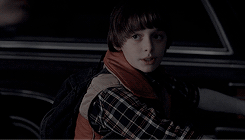
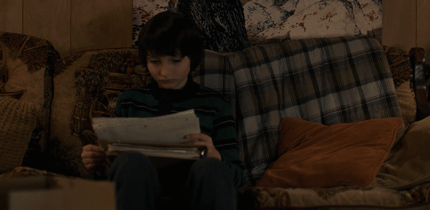
2. Mr. Clarke’s room
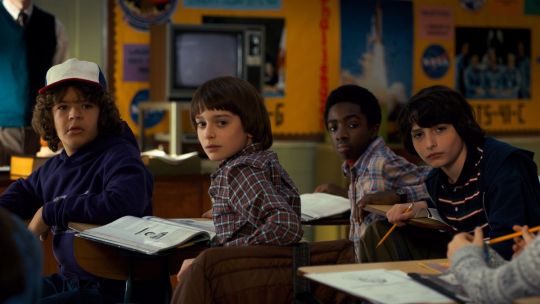
The next shot we see of the boys is in Mr. Clarke’s classroom, just before Max is first introduced. They sit in two rows of two: Dustin and Lucas in front; Will and Mike in back. This, if just visually, emphasizes the “pairs” theory I discussed earlier. Dustin and Lucas look at and whisper to only each other.
3. Will gets in Joyce’s car while Dustin, Lucas and Mike watch from a distance

The physical set up of this scene again is deliberate. Mike is in front, with Lucas and Dustin behind him. (If you think this is grasping at straws, try picturing the scene with Dustin up front - it changes the mood). All the boys are concerned; Mike especially so. The exchange is as follows: Lucas asks, “Do you guys think he’s okay?”, to which Mike says, “I don’t know, he’s quiet today”. Lucas responds, “He’s always quiet.”
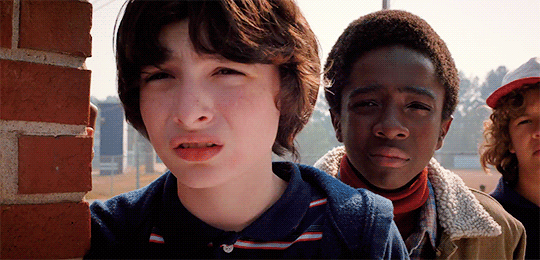
Then, the camera zooms in on Mike’s particularly troubled expression. We, the audience, KNOW that all is not well. We KNOW Will had an episode the night before, which explains why “he’s quiet today”. Lucas dismisses Mike’s uncertainty, but WE know that Mike is right. This is supposed to tell us that out of the group, Mike is the most intuitive/perceptive when it comes to Will, and that Lucas and Dustin obviously care very deeply for Will, but don’t know him like Mike does.
4. Lucas and Dustin at the arcade.
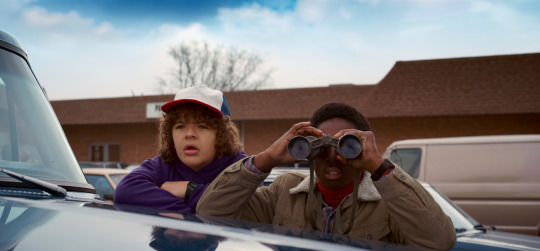
In this scene, Lucas and Dustin are at the arcade, trying to figure out if Max is MadMax. Will isn’t there because he’s at Hawkins lab, but where is Mike? Mike is uninterested in Max from the beginning (and so is Will, for that matter, beyond wanting to figure out if she’s MadMax. I don’t think we ever see them interact directly).
Mike is unessential to the scene, so there’s no real reason to have him there, but I thought it was interesting that they weren’t all hanging out. This scene demonstrates that Lucas and Dustin are a pair. They have shared jokes, a witty banter, and now a shared goal, which is to befriend Max. That goal bonds them and frames their eventual storyline of setting a trap for Dart.

5. Will drawing in his room
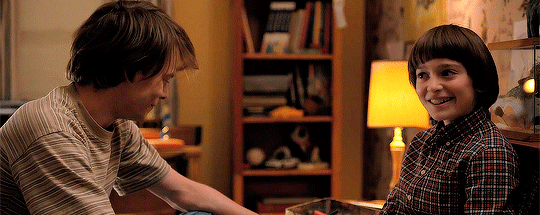
(Sorry guys - I couldn’t find a screencap of the line I wanted; if you find one where Will says Mom, Dustin, Lucas, Everyone” PLEASE let me know!)
When Will takes Jonathan to task for treating him like a baby, he implicates “Mom, Dustin, Lucas, everyone”. The only person he doesn’t mention is Mike, which is interesting, because so far, Mike is the only one of the friend group we’ve seen express concern for Will in any capacity. This is ABSOLUTELY on purpose. Again, it emphasizes their close relationship and alludes to a symbiosis: later in the exchange, Will says “It doesn’t help. It just makes me feel like more of a freak.” Perhaps he doesn’t feel alienated by Mike’s help because Mike has been through something similar, which makes him also a freak.
It’s worth it to mention that Will has no screen time alone with any of the other characters. I think it’s probably because the writers felt the only relationship of Will’s they needed to emphasize was with Mike.
SO...
That’s it for episode 1! Let me know if there’s anything I missed!
#will byers#mike wheeler#byeler#byler#mike x will#will x mike#will is gay#gay will#gay will byers#stranger things#Stranger Things Season 1#stranger things 2#stranger things s2#stranger things season 2#madmax#lucas sinclair#dustin henderson#Joyce byers#jonathan byers#character analysis#myposts#shotbyshotanalysis#max mayfield#eleven#Jane ives#lumax
1K notes
·
View notes
Text
Backyard Nothingness: Searching For R F
Written By: F. John Surells
The past belongs to those who lived it. But if we of today wish to learn from its lessons, then we must become a part of all the truths God granted it at each and every juncture. And liberation is unquestionably important, yet is always only achieved for a price. And for the individual, that price is usually paid where the crowd wishes not to tread.
When I accepted Mayor George Jennifer’s challenge to write all three parts of “Backyard Nothingness,” I agreed to the guidelines which he said must be followed in those writings. But I issued one stipulation to him – which he accepted, i.e. although the separate pieces of the three part disclosure might be titled for certain individuals, it would not be solely those individuals to whom, or about whom those separate pieces would exclusively speak.
And in that manner then this last installment of “Backyard Nothingness” references a friend of many of us in this city. And, although he doesn’t live in our city, he does visit us here from time to time. And I can tell you that if anyone would ever graciously, and perhaps even thankfully admit that he doesn’t own the center part of any stage, it would be my friend R. F. Husnik. Therefore, what follows now are some observations engendered as a result of conversations with him, as well as some anecdotes told to me by him and others.
I’ve always wondered if those who look back upon the lives of others see first and foremost the good that could have been achieved there. And then, I’ve also wondered if they sometimes forget that but for a few spins of negativity’s wheel, any individual could have easily strayed into domains of sin and criminality, to be punished temporally by human courts, or far worse, eternally by the Triune Master.
Nonetheless, I know this: No congress can ever send out enough dollars to pay for a sunny day! But when mankind suffers a great plague, then it needs its prayers for itself, offered up in all humility – God please stop the coronavirus.
And, in conjunction with my personal prayer, I’m also wondering if my friend R. F. Husnik will be able to visit our city again this summer as he has now for the last three. Yes, he’s the man who acquainted me with the concept of “zones” being utilized to demonstrate one’s characteristics or aspects of being. And he said that within what might be termed the “mindset of common man” existed probably only two such zones, i.e. the good one, and the bad one. But, he also acknowledged that that interpretation would most likely speak only to the universality of all matters.
Yet, personally, I can’t help but think that there’s a lot more to life than simply deducing what’s good and what’s bad. After all, our lives consist of physical activities, and, surely it can be said that they all first begin in a zone of beginnings, but then ultimately end in a … well, end zone. Or, sadly, is there also sometimes a third zone which speaks to both universality and physicality? And is that a zone of nothingness in which all proceeds unobtrusively until someone says or does something which doesn’t “sit well” with someone or some group? That’s a question which no doubt generates many diverse answers. Yet, I’m thinking the most truthful of those answers is “Probably so.”
Still, who can deny that nondescriptly is how most mortals wish to live? And who can deny that in the final analysis, though what’s left behind by those now deceased will still matter to those still living, such assets and philosophies of life won’t sway the final decisions of eternity’s judges, although of course they’ll play a part in those decisions.
And what about the falsehoods which were added to, and acts of goodness which were subtracted from any mortal’s resume of earthly deeds by those who thought they knew all that needed to be known about any certain mortal? Maybe that’s a question which warrants serious consideration early on in the lives of all mortals, before the “status-quo” begins its earnest lifelong courting of them, and begins then to hammer its nails into what it wishes might be their earthly coffins, and asks of them then (when it can find the time to take leave of its primary pursuit, i.e. the dissemination of rumors, half-truths, and outright lies) “When are you ever going to grow up? Don’t you feel you’ve wasted a lifetime by featuring little else than the casting of stones against those who believe that basically ‘anything goes’ should be the mantra of modern day man?”
But oh, I’ll need to speak boastfully now! The “status-quo” has tried tirelessly to convert me. Yet, years ago I formulated my personal answers to the questions asked in the last paragraph. And I’ll summarize those answers by saying that I’ve never been a believer in “anything goes,” because when any, or everything has the possibility of going either down or away, a lot of evil then has the potential to surface, and a lot of possible goodness may then simply “fade away” as well. And as far as “growing up” is concerned, sometimes my thoughts do stray back to the days before I came to this city. In fact, just a few days ago I was looking at some old photographs from years ago when suddenly what appeared on them seemed so real – so real that I was almost transported back there – back to the actual moments portrayed on those pictures! And I suppose nostalgia and melancholy overwhelmed me then. And in my mind I said then “When we’re very young, most of us surmise that there’s so much we’ve not yet learned. But probably our greatest realization occurs when we fathom that all those who follow us will also experience what we’re experiencing at that current moment. And that’s how it will be forever down the line! And mom and dad, no, I never became what you and your friends thought I would. My lot in life was not to become the standardized mortal who daily goes about his or her business, slaying the dragons of the everyday as becomes necessary from moment to moment. My lot in life, for whatever reason, was to become part of an existential, and fairly conservative clique of artistic types who live along the north shore of a river which divides into two sections what probably is the only city upon planet Earth which truly can be designated as being ‘underground’ in the strictest figurative, but not literal interpretation of that term.”
And experience has taught me that I can make a good guess at the “status-quo’s response to what I’ve just said. Its answer: “To me, it seems you’re someone who’s simply living in the past; and particularly within two decades of it. Somehow I can picture you driving down the highways of America in a car from 1957 with large white ‘fins’ or ‘wings’ on its sides, and calling out ���I like Ike’ to passersby along the roadway who may or may not have initially called that out to you. Yet, I can also visualize you on a warm summer day during a decade of roaring. And as you partake of a beverage that’s been recently prohibited, you wink at the picture of President Coolidge which hangs on your living room wall, and proceed outdoors to do some ‘work’ on your 1923 Dodge. But right next door there’s a party going on. And you can hear and see some flappers, and cigarette smokers, and hat and pinstripe wearers. And you know they’re having a good time over there – next door. They’re laughing, drinking, smoking, yelling, and causing quite a ruckus. And some are even dancing the Charleston. And a few well-dressed guys and gals stray on to your property and ask if they can help work on your Dodge, but you thank them and send them back to their party. And then your neighbor, who is sponsoring the festivities next door, also comes out to speak to you. And he’s carrying some sort of yard sign, and says to you ‘You don’t have to worry about the cops or anyone else coming over here and trying to end our celebration.’ And then he goes back on his own property and pounds the sign he’d been carrying into the lawn of his front yard. The sign says: AUTHORITIES – KEEP YOUR HANDS OFF THE ROARING TWENTIES.”
“But then you call back to your neighbor and say ‘I don’t know if you know this, but I’m a time traveler. And today I’ve come here to the middle of the 1920’s to see if I can find some means to aid those of us who’ve just entered the decade of the 2020’s.’”
‘“ So, you’re from a hundred years hence are you? Well, then you know my generation’s future don’t you?”’
“You nod in the affirmative. And then your neighbor says, ‘Don’t tell me what it is, but just answer this question for me please: These days of partying and wild living will end in a nasty fashion eventually, won’t they?”’
“Again you nod affirmatively.”
“But then suddenly there’s a focus shift, and then you’re gone from the days of post WWI, pre-depression, and pre WWII revelry. And then, back in the presence of 2020’s realism, you find yourself postulating about many mortals’ apparent need to live for today only. And that leads you to question the magnitude of any certain human’s probable past painfulness, as well as his or her inability to foresee or care about the future. And you’ve always surmised that hand in hand with one’s struggle to find a synthesis between one’s past, present, and future existed another significant enigma which affects all humans in varying degrees; and that phenomenon is the determination of at what point looking at the past objectively stops, and feeling sorry for oneself begins, and visa versa.”
But by this time I’d wearied of speaking to the disciple of the “status-quo.” I said “That’s enough” and walked away. And you know, sometimes all the political and philosophical posturing just becomes too much. And it’s at times like those that my thoughts often stray to a friend of our city who’s come to see us during the last three summers. And of course I’m speaking now of R. F. Husnik. So I decided to give R. F. a call that day. I didn’t really expect to reach him, but to my joy I was mistaken.
“Are you going to visit our city again next summer?” I asked him. “I heard your local football team did fairly well last year.”
“Yes it did!” he said. “But you know, before we make any decisions about this coming summer we’ll have to admit that most likely the coronavirus will make those decisions for us. Nevertheless, I was thinking that if we could meet up during any of the summer months, maybe this year for a change it would be nice if you and Renni, and some of the other people I’ve come to know from your city could come to my city for once. We could all go on a tour of the stadium. And I’d especially like it if Orlon and your new mayor could come out here. Oh, and bring those other famous couples (Rashon and Amber, Corzer and Valerie, and Joe and Sharon) along too! And I almost forgot something! I’d really like it if some of you people could go to some of those famous car shows with me next summer – like Iola and Symco – if indeed they’ll be held.”
“Well, I’ll mention it to Renni and the rest of the ‘guys’ and let you know what they say,” I answered. “But you’re right, it might all depend upon the coronavirus. And say, before I let you go, do you have one of your famous stories for me and my friends?” I asked.
“Should I just leave you with this anecdote which was told to me by a friend many years ago?” R. F. asked.
“Sure” I said.
“Well, it seems that a friend of mine was riding in the back seat of another friend’s car many years ago. Now the other guy was driving of course, and he and my friend were both in their late teens then, and were, as we say ‘joy riding’ with two girls of their same age. Suddenly the car radio began playing a song about a girl with brown eyes. And then the girl who was in the back seat of the car with the guy who told me this story said to him ‘You can kiss me now.’”
“But my friend apparently answered then, ‘We have two problems here. First, you should have said ‘You may kiss me now.’ And second, your eyes aren’t brown like the girl’s on the song now playing.’”
“Are you sure that guy in the back seat wasn’t really you?” I then asked of R. F.
“No, it wasn’t me,” he answered. “FJ disapproved of guys riding around with, and kissing girls in the back seats of cars back in those days.”
0 notes